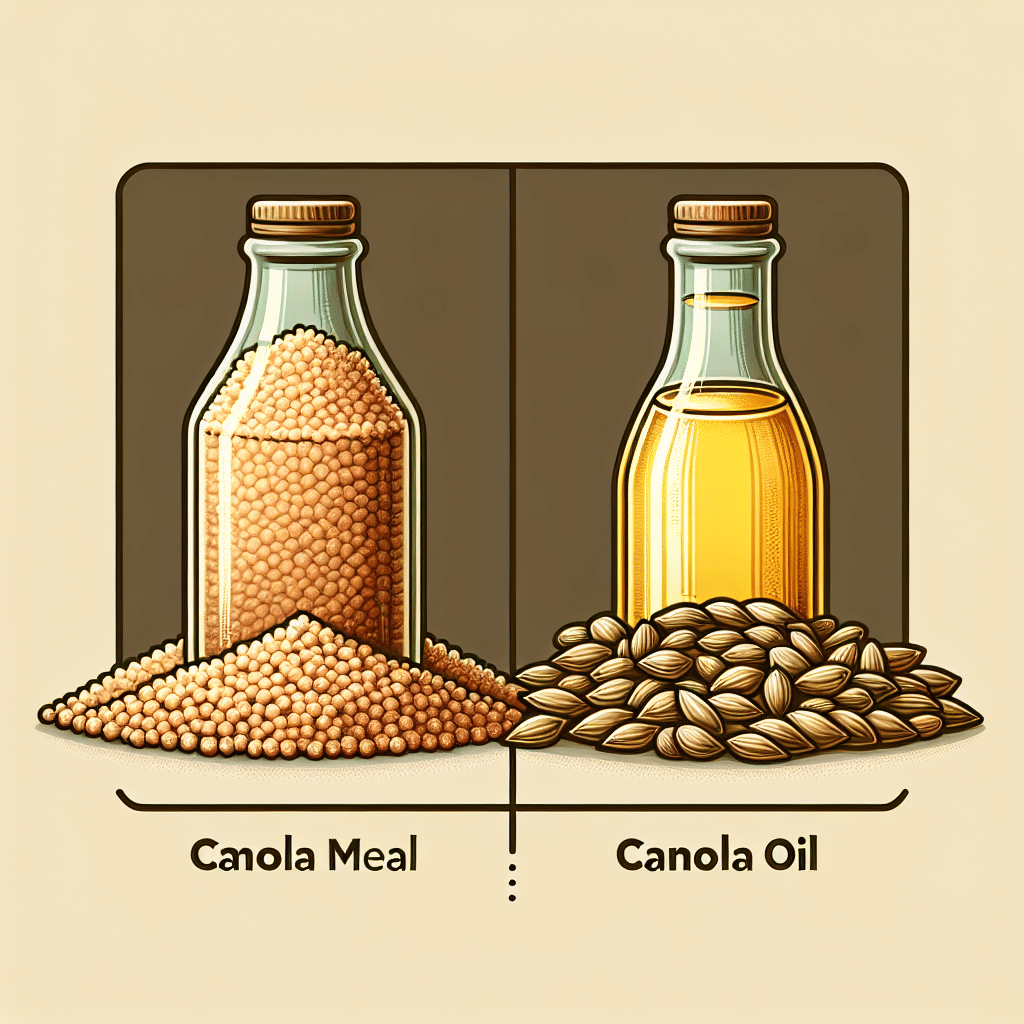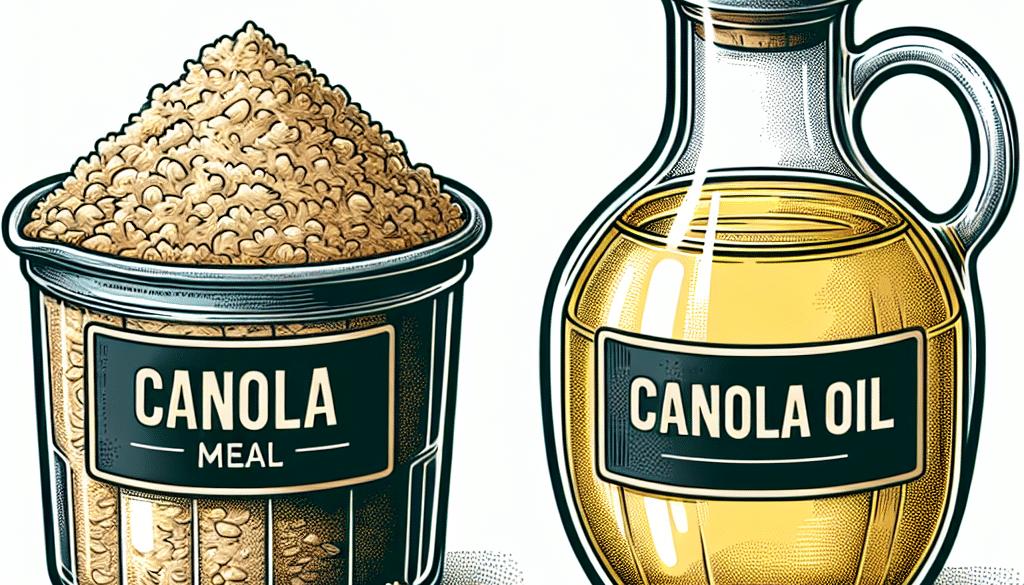Is Canola Meal The Same As Canola Oil?
-
Table of Contents
- Canola Meal vs. Canola Oil: Understanding the Differences
- What is Canola?
- Production of Canola Oil and Canola Meal
- Canola Oil: A Kitchen Staple
- Canola Meal: An Animal Feed Powerhouse
- Nutritional Differences
- Uses of Canola Oil and Canola Meal
- Environmental Impact
- Case Studies and Statistics
- Conclusion: Distinct Products with Unique Benefits
- Discover ETprotein’s High-Quality Protein Products
Canola Meal vs. Canola Oil: Understanding the Differences

When it comes to canola, there’s often confusion between canola meal and canola oil. Although both products originate from the same plant, they serve different purposes and have distinct properties. This article will delve into the differences between canola meal and canola oil, their production processes, nutritional profiles, and uses. By the end of this read, you’ll have a clear understanding of how these two canola derivatives are not the same and how each fits into various industries and dietary practices.
What is Canola?
Before we differentiate between canola meal and canola oil, it’s essential to understand what canola is. Canola is a type of rapeseed that has been bred to have low levels of erucic acid and glucosinolates, making it safe for human and animal consumption. The name “canola” is a contraction of “Canadian oil, low acid,” reflecting its origins and characteristics.
Production of Canola Oil and Canola Meal
The journey from canola seed to oil and meal involves several steps:
- Harvesting: Canola plants are harvested when the seeds within the pods reach the desired maturity.
- Crushing: The harvested seeds are crushed to extract the oil, resulting in a mixture of oil and solid residue.
- Separation: The oil is separated from the solid residue through a process of pressing or solvent extraction.
- Refining: Canola oil undergoes refining to remove impurities, resulting in the clear, golden oil found on supermarket shelves.
The solid residue left after oil extraction is processed into canola meal, which is used primarily as animal feed.
Canola Oil: A Kitchen Staple
Canola oil is a popular cooking oil favored for its light flavor, high smoke point, and health benefits. It’s rich in monounsaturated fats, which can help reduce bad cholesterol levels and lower the risk of heart disease. Canola oil also contains omega-3 fatty acids, known for their anti-inflammatory properties.
Canola Meal: An Animal Feed Powerhouse
Canola meal is the byproduct of oil extraction and is primarily used as a protein-rich feed for livestock, poultry, and fish. It’s valued for its high protein content, typically around 36-38%, and its balanced amino acid profile, which is essential for animal growth and health.
Nutritional Differences
While both canola oil and canola meal come from the same plant, their nutritional profiles are vastly different:
- Canola Oil: High in healthy fats, low in saturated fats, and contains no protein or fiber.
- Canola Meal: High in protein, fiber, and essential minerals but contains minimal oil content.
Uses of Canola Oil and Canola Meal
Canola oil and canola meal have distinct uses in various industries:
- Canola Oil: Used in cooking, salad dressings, and food processing. It’s also utilized in the production of biodiesel and industrial lubricants.
- Canola Meal: Primarily used as animal feed, but also explored as a potential ingredient in human food products due to its high protein content.
Environmental Impact
The production of canola oil and meal has environmental implications. Canola farming practices can affect soil health, water usage, and biodiversity. However, the canola industry has made strides in sustainable farming, including crop rotation and reduced pesticide use.
Case Studies and Statistics
Research has shown that incorporating canola meal into dairy cow diets can increase milk production without compromising quality. Additionally, the demand for canola oil continues to rise due to its health benefits, with the global market expected to reach USD 44.4 billion by 2027.
Conclusion: Distinct Products with Unique Benefits
In summary, canola meal and canola oil are not the same. They are distinct products derived from the canola plant, each with its own production process, nutritional profile, and uses. Canola oil is a heart-healthy cooking oil, while canola meal is a protein-rich animal feed. Understanding these differences is crucial for consumers, farmers, and industries alike.
Discover ETprotein’s High-Quality Protein Products
If you’re interested in high-quality protein products, consider ETprotein’s offerings. They provide a range of organic bulk vegan proteins and L-(+)-Ergothioneine (EGT) suitable for various industries, including nutraceuticals, pharmaceuticals, and food and beverage.
About ETprotein:
ETprotein, a reputable protein and L-(+)-Ergothioneine (EGT) Chinese factory manufacturer and supplier, is renowned for producing, stocking, exporting, and delivering the highest quality organic bulk vegan proteins and L-(+)-Ergothioneine. They include Organic rice protein, clear rice protein, pea protein, clear pea protein, watermelon seed protein, pumpkin seed protein, sunflower seed protein, mung bean protein, peanut protein, and L-(+)-Ergothioneine EGT Pharmaceutical grade, L-(+)-Ergothioneine EGT food grade, L-(+)-Ergothioneine EGT cosmetic grade, L-(+)-Ergothioneine EGT reference grade and L-(+)-Ergothioneine EGT standard. Their offerings, characterized by a neutral taste, non-GMO, allergen-free attributes, with L-(+)-Ergothioneine purity over 98%, 99%, cater to a diverse range of industries. They serve nutraceutical, pharmaceutical, cosmeceutical, veterinary, as well as food and beverage finished product distributors, traders, and manufacturers across Europe, USA, Canada, Australia, Thailand, Japan, Korea, Brazil, and Chile, among others.
ETprotein specialization includes exporting and delivering tailor-made protein powder and finished nutritional supplements. Their extensive product range covers sectors like Food and Beverage, Sports Nutrition, Weight Management, Dietary Supplements, Health and Wellness Products, and Infant Formula, ensuring comprehensive solutions to meet all your protein needs.
As a trusted company by leading global food and beverage brands and Fortune 500 companies, ETprotein reinforces China’s reputation in the global arena. For more information or to sample their products, please contact them and email sales(at)ETprotein.com today.












